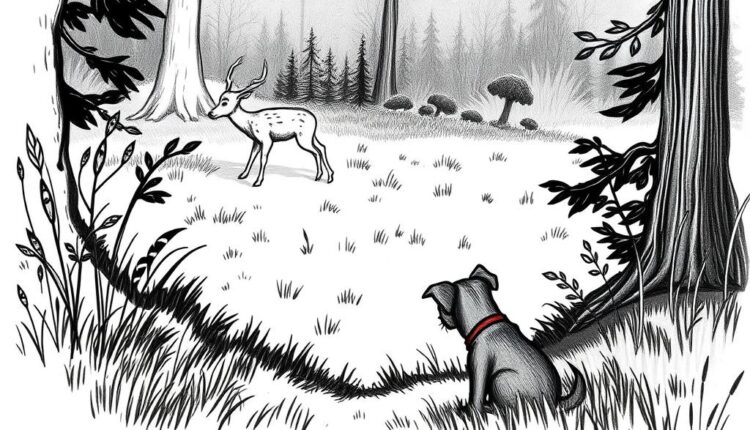The King Who Learned Not to Judge by Appearances
Firdous Ahmad Malik
Once upon a time, in a faraway kingdom, there lived a mighty king who was famous not only for his wealth and wisdom but also for his love of hunting. The king had a grand palace, tall walls, strong soldiers, and lush gardens, yet what he loved most was spending his time in the forests chasing wild animals. For this passion, he kept the finest hunting dogs anyone had ever seen. They were strong, fast, and trained to chase deer, boars, and even wolves.
Among these dogs, there was one little dog that did not look impressive at all. He was small in size, his legs were short, and his speed could never match the long-legged hounds of the king. The other dogs often mocked him, saying he was unfit for hunting and had no use in the king’s court. “Look at you,” they would bark, “you can’t even run properly. How will you ever catch a deer?” The little dog, however, never argued. He simply wagged his tail, kept quiet, and watched everything with sharp eyes. Deep inside, he believed that strength and speed were not everything—wisdom and cleverness also had their place in life.
One fine morning, the king decided to go hunting in the nearby forest. The air was cool, the trees were dense, and birds chirped in the canopy. The king mounted his horse, while his pack of powerful hounds ran ahead, eager for the chase. The little dog, too, followed behind, though at a slower pace. Everyone laughed when they saw him. “By the time you reach the forest, the hunt will be over,” barked one of the big dogs. The little dog smiled silently, knowing something they did not.
Soon, the king and his pack spotted a beautiful deer. With a shout, the king urged his dogs to give chase. Like arrows, the hounds sprang forward, their muscles rippling, their paws thundering against the earth. The deer, frightened but swift, darted into the thick forest, twisting and turning between trees, running in circles to confuse its pursuers. The big dogs ran with all their might, but the deer was clever and quick. One by one, the hounds grew tired. Their tongues hung out, their breath grew heavy, and yet the deer managed to escape their grasp every single time.
The little dog had not joined the wild chase. Instead, he sat quietly near a thick bush, his eyes observing carefully. He noticed that the deer, though clever, had a habit of circling back along the same paths. “If it has passed from here once,” thought the little dog, “it may pass again. Why should I waste my strength in chasing when I can use my mind?” So he lay low, waiting patiently, while the others ran further and further away, losing both energy and direction.
After some time, as the forest grew quieter, the deer indeed came running back through the same narrow path. It was tired, panting, and less cautious now, thinking it had shaken off the pack of hounds. Suddenly, the little dog sprang from the bushes and barked with all his strength. Startled and frightened, the deer turned sharply and ran straight into the open field where the king was waiting. The king’s arrow struck true, and the deer fell.
The big dogs returned soon after, exhausted and empty-pawed. They were shocked to see the deer already lying at the king’s feet. The king looked around and asked, “Which of my hounds cornered this deer?” To his surprise, it was the small dog who came forward wagging his tail. The king was amazed. “How is it possible that you, the smallest and weakest among them, managed to bring this mighty animal to me?” The little dog bowed his head humbly, as if to say, “Strength alone cannot win every battle. Sometimes wisdom achieves what strength cannot.”
The king was deeply impressed. That day, he rewarded the little dog with a place of honor in the palace. From then on, he never judged anyone by appearance alone. He declared to his courtiers and soldiers, “Remember this well: the smallest among us may hold the greatest wisdom. Do not laugh at the weak, for one day they may succeed where the strong fail.”
The other hounds felt ashamed of their arrogance. They realized that they had underestimated the little dog simply because of his size and speed. From that day forward, they respected him and even sought his guidance during hunts. The little dog, however, never boasted about his cleverness. He remained humble, friendly, and loyal, proving time and again that intelligence and patience were just as powerful as strength and speed.
The story of the king and the clever dog spread far and wide. Parents told it to their children as a lesson, teachers narrated it to students, and even travelers carried it to distant lands. The moral was always clear: never mock those who appear weak or small, for true worth lies not only in power but in the wisdom of the mind and the purity of the heart.
In the end, the little dog lived a happy and honorable life in the palace. He had no need to prove himself anymore, for everyone knew the truth—that sometimes, it is the smallest spark of cleverness that lights up the darkest path.
Moral of the story: Intelligence and patience can achieve what raw strength and speed cannot. Never underestimate anyone by their size or appearance.
The writer is a columnist and research scholar of Political Science at Mansarovar Global University, Bhopal, M.P. He can be reached at: artistmalik12@gmail.com


Comments are closed.